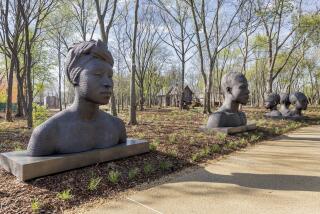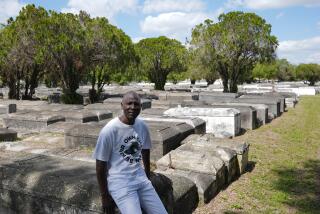The Siren Song of James Brown Frustrates Hometown Boosters
- Share via
AUGUSTA, Ga. — Most of the world knows this city for its fabled golf tournament, the Masters, but there is one other natural tourist draw that screams out for recognition: the legacy of the man they call Mr. Dynamite, Soul Brother No. 1, the Minister of the New New Super Heavy Funk and, more often than not, the Godfather.
But James Brown is a complicated superstar. And in his hometown of Augusta, building a tourism effort around him hasn’t been easy.
The city, a former bastion of segregationist sentiment, named a portion of a major thoroughfare for the soul singer in 1993. At the time, some Augustans grumbled that Brown had been in jail just two years earlier, after brandishing a shotgun at an insurance seminar and leading police on a two-state car chase.
In 2003, the city planned to erect a bronze statue of Brown in the middle of town, and the local arts council planned to rename its yearly music festival in his honor.
But in January 2004, Brown was arrested on domestic abuse charges. A mug shot of the star -- his brow furrowed, his coif impossibly frazzled -- became a staple for tabloid newspapers and late-night comedians. The festival was off, and the statue was put on hold.
Brown reconciled with his wife and eventually some of the discomfort dissipated. Last year, his statue was dedicated with much fanfare and in recent months the city began touting a new event, the James Brown “Soul of America” Music Festival, a Memorial Day weekend concert series meant to dovetail with an aggressive James Brown-themed tourism campaign.
Organizers billed the event as an opportunity to showcase Augusta as “a model city of diversity.”
But instead of becoming a source of civic pride, the new festival is mired in controversy. This month, Brown’s business manager said the performer and his band would not play at the event because of a contract dispute with the private promoter, Charles “Champ” Walker Jr., who says Brown promised to play for free.
Walker has come under fire for mismanaging the festival. But some residents partially blame Brown, whose eccentric business dealings are legendary around town. Once again, Augustans are also musing on Brown’s legacy in the city -- and the challenge of recognizing the prophet of funk in his own land.
“The truth is,” said Augusta Commissioner Don A. Grantham, “it’s easier to name something after people who are no longer here, who are no longer alive.”
With no guarantee that their guest of honor will perform, festival organizers are pressing on with a small roster of little-known artists. Meanwhile, the Augusta Convention and Visitors Bureau is preparing a first-ever brochure that offers a tour of some of the important landmarks from Brown’s life in Augusta: the old church building where he learned to play piano; the former site of WRDW radio station, where the young Brown danced for tips from soldiers; and the Bell Auditorium, where he recorded much of the 1970 live double album “Sex Machine.”
“Augusta is blessed with international name recognition just because of the golf tournament -- that’s our most unique identifier,” said visitors bureau President Barry White. “We’re fortunate to have one just as strong with James Brown, and we need to make sure we maintain that link with James Brown.”
The text of the brochure doesn’t shrink from the more troubling realities of Brown’s life. It notes his early life of poverty -- still a reality for about 20% of Augusta residents -- as well as his upbringing in a brothel and his childhood scrapes with the law.
It is an underdog story for an underdog city. Augusta, a city of 195,000, is rich in Revolutionary War and Civil War history, but it exists in the shadow of charming Savannah to the south and flashy Atlanta to the west. It is a city of work, of heavy industry and chemical plants; for years, Southern wags have referred to it as “Disgusta.”
The nickname is growing difficult to justify. A brick-lined Riverwalk was built on the banks of the Savannah River in the mid-1980s, and cafes and bars are popping up downtown. Three years ago, a nonprofit aligned with the city began running tour boats on the city’s 19th century industrial power canal.
Those attractions are hyped in the city’s main tourism campaign, which fits them all into a cheeky golf theme: Photos of the canal boats are paired with the phrase “In Augusta, not all water is a hazard.”
Downtown merchants welcome the new effort to market Brown’s connections to the city (he moved to Augusta at age 5, and currently lives across the river in the South Carolina suburb of Beech Island). Brian Bennett, who rents and sells scooters out of a downtown storefront, would like to see a Hard Rock Cafe-style museum of Brown’s mementos and costumes.
“If they had a place where you could see all of his stuff, I think it’d be a great draw,” he said.
Others wonder whether Augusta could ever pull off a sufficient tribute. Shama Cartwright, owner of an Afrocentric clothing store, said the city was too conservative -- and perhaps too fraught with racial tension -- to ever fully accept Brown, a radical musical innovator who pushed a positive black-power message with songs like “Say It Loud, I’m Black and I’m Proud -- Part 1.”
“You listen to some of his music, and they wouldn’t ever play it at the Masters,” Cartwright said. “Liberal lyrics in a conservative city.”
These days, the city’s white leaders enthusiastically acknowledge Brown’s legacy. But there was a time when hitching Augusta’s reputation to a black man’s star would have indeed been unthinkable.
Since 1878, a marble monument on Broad Street has honored the Confederacy with the words “No nation rose so white and fair.” In the late 1960s, some whites organized in an attempt to keep Brown from buying a house in one of the city’s most exclusive neighborhoods.
Their attempts failed, and Brown shook off the slight with remarkable good humor in his 1986 autobiography, “James Brown: The Godfather of Soul.”
The house, he wrote, “was in a white section of town, but that was all right with me -- I wasn’t prejudiced.”
For all of the trouble Brown has caused, he has also made significant contributions to Augusta. In 1970, at the request of then-Gov. Lester Maddox, he appealed for calm during a black riot inspired by the death of a black jail inmate, using the power of the local radio station he owned at the time. At Christmas and Thanksgiving, he gives toys and turkeys to the poor.
Brown’s business manager, David Cannon, said that Brown would love to play his namesake festival but that Walker, the festival organizer, had waited too long to contact Brown’s organization about the particulars and Brown had already booked dates in the Northeast.
Cannon said that the singer and his band were offering to play the show for free but that organizers would have to come up with $25,000 to fly them to Augusta.
Cannon said Brown had also mentioned “serious financial issues” with the festival plan. The budget and other arrangements were sketchy in mid-March when Walker met with city officials. The Augusta Chronicle reported that three of the charities the event was supposed to benefit -- a James Brown museum, scholarship fund and music school -- did not exist.
“The only thing that I’ve been trying to do with this is to make sure that Brown is not blamed for this,” Cannon said. “Because he had nothing to do with this screw-up.”
But even as a no-show, Brown can spark controversy. At a recent festival planning meeting, volunteer music director Lynwood Holmes said he was going to have trouble recruiting church singers for the planned “Spirit of America” choir because the festival honored the “secular” Brown -- a man who once penned an ode to hot pants.
Holmes suggested that the promoters try to attract a gospel star to the show “to get ‘em kind of forgettin’ about James Brown and thinkin’ about Jesus.”
More to Read
The biggest entertainment stories
Get our big stories about Hollywood, film, television, music, arts, culture and more right in your inbox as soon as they publish.
You may occasionally receive promotional content from the Los Angeles Times.










